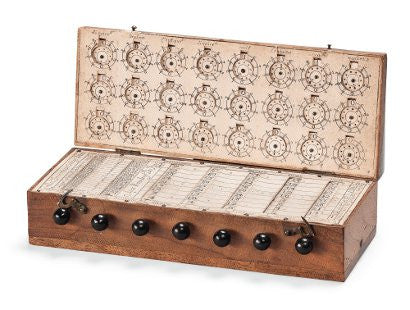A rare example of one of the world's first portable calculators is coming to auction in London this October.
Frenchman Rene Grillet de Roven produced the 14x32-centimetre wooden machine in around 1673.
 Addition, subtraction, multiplication and division are all possible... (Image: Christie's Images Ltd. 2013) |
It is one of just four known examples of this design, and the only one in private hands - further adding to its attraction to collectors. As such, we feel it completely warrants the high estimate of £100,000 ($155,098) ahead of its sale at Christie's Travel, Science and Natural History auction on October 10.
The head of travel, science and natural history at Christie's London, James Hyslop, explains more.
"This pocket-sized calculator is one of the earliest surviving pieces in the history of the computer," he says.
"Mechanical calculators date from the 1640s, but were big clunky brass machines. This small lightweight machine, based on Napier's logarithms was one of the earliest portable designs."
The machine is capable of performing a multitude of arithmetic calculations, including the always-tricky division.
Grillet, who was the watchmaker and mechanician to French king Louis XIV, displayed the machine at fairs in the Netherlands and Paris throughout the 1670 and 1680s.
Important scientific instruments and documents have a habit of performing well at auction. One of just three original examples of the Daniel Fahrenheit thermometer made £67,250 ($107,802) at Christie's London in 2012, while a letter that scientist Francis Crick wrote to his son regarding his discovery of the structure of DNA sold for $6m in April, a world record for a letter at auction.
We currently have this signed Thomas Edison document in stock.






